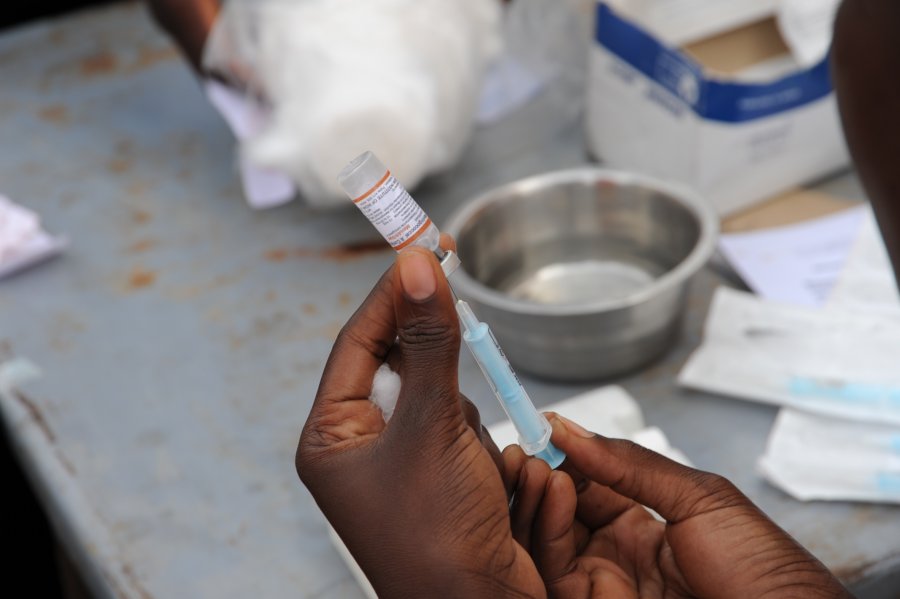LSHTM wins two awards for research into expanding vaccine access and combatting misinformation
14 August 2020 London School of Hygiene & Tropical Medicine London School of Hygiene & Tropical Medicine https://lshtm.ac.uk/themes/custom/lshtm/images/lshtm-logo-black.png
Vaccine in Burkina Faso. Credit: WHO
Dr Kate Gallagher named Sabin’s Rising Star Award
The Sabin Vaccine Institute (Sabin) has awarded its inaugural Rising Star Award to Dr Katherine Gallagher, Assistant Professor of Epidemiology at LSHTM, for her work expanding access to immunisation through thoughtful research and advocacy.
This recognition honours an early-career professional who has demonstrated leadership in and commitment to the field of immunisation.
Dr Gallagher’s research has informed the global recommendations for human papillomavirus (HPV) vaccine programs, and supported clinical trials for Ebola vaccines in the midst of the 2014 epidemic. She is now leading a trial based at the KEMRI-Wellcome Trust Research Program in Kilifi, Kenya, which is exploring how smaller doses of vaccines against bacterial pneumonia could result in more cost-effective and equitable access to these critical vaccinations.
Dr Gallagher said: “I see immunization as an integral element of working toward health equity. Vaccines are one of the easiest, most cost-effective interventions that can address some of the imbalances that occur simply based on circumstances of birth. I’m honoured to receive this meaningful award, which captures the spirit of what it means to work in immunisation, and am so grateful to my numerous mentors and supervisors who continue to guide me in this work.”
The Vaccine Confidence Project (VCP) selected as one of the winners of Facebook’s research awards on misinformation and polarization
The 2019/2020 COVID-19 pandemic is not just a health problem – it is also fuelling an infodemic on an unprecedented scale. Since the beginning of the outbreak, the digital media ecosystem has been flooded with “alternative explanations” and conspiracy theories.
At the end of February, Facebook Research launched their ‘Foundational Integrity Research: Misinformation and Polarization’ research awards. The goal is to support independent research that will contribute to the understanding of these phenomena and, in the long term, help improve their policies, interventions, and tooling.
Following over 1,000 proposals from 600 institutions and 77 countries, VCP’s project, “The contagion of misinformation”, was announced as one of the award winners.
The aim of the project is to understand how health misinformation around COVID-19 spreads in the context of private social media, and to develop strategies to identify misinformation that is most likely to transition from Private Social Messaging into the Public Social Media/domain.
The current attention to misinformation is still very focused on public social media such as Facebook and Twitter. There is however a growing body of evidence that private messaging services such as Telegram, WhatsApp or Link are just as likely to spread misinformation as publicly available social networks.
Rumours can start on a private social network, go viral in minutes, and only then spread to public social networks. The closed nature of private social networks makes it impossible to identify the origin of rumours as not even the service’s employees can read the content of messages that were not intended for them. The only window of opportunity to see how misinformation spreads on private social networks is to ask their users to share it with researchers when they see it.
Professor Heidi Larson, Director of the Vaccine Confidence Project (VCP), said: “We are thrilled to learn that we are one of the winners in this highly competitive call. I am confident that our proposed innovative approach to investigating misinformation networks has the potential to create a truly transformative tool to inform misinformation intervention.
“Our vision is to become a world leader in methodological innovation in the space of health misinformation and we will continue to working on innovative projects, such as this, that aim to push the methodological boundaries and address pressing social and policy issues.”
Simon Piatek, digital lead at the VCP said: “This study draws on traditional social science methods of surveys and content analysis to develop an innovative methodological approach, capturing misinformation and tracking its spread on private social networks using crowdsourcing tool with the aim to see how/if it then migrates to public social media. The entire VCP team is thrilled to be able to start working on this innovative project.”
For this project, the VCP will be working with Premise – a global leader in crowdsourcing that combines the power of a global network of two million on-the-ground contributors with industry-leading data science and machine learning.
Maury Blackman, CEO of Premise Data said: “Misinformation surrounding healthcare, particularly in the context of the global COVID-19 pandemic, can lead to serious harm. Premise is delighted to partner with the LSHTM on this innovative and important project.”
If you enjoyed this article and would like to build a career in global health, we offer a range of MSc programmes covering health and data, infectious and tropical diseases, population health, and public health and policy.
Available on campus or online, including flexible study that works around your work and home life, be part of a global community at the UK's no.1 public health university.